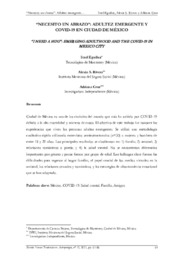Por favor, use este identificador para citar o enlazar este ítem:
https://hdl.handle.net/11000/36721Registro completo de metadatos
| Campo DC | Valor | Lengua/Idioma |
|---|---|---|
| dc.contributor.author | Eguiluz, Itzel | - |
| dc.contributor.author | Sánchez Rivera, Alexia | - |
| dc.contributor.author | Cruz, Adriana | - |
| dc.contributor.other | Departamentos de la UMH::Ciencias Sociales y Humanas | es_ES |
| dc.date.accessioned | 2025-05-27T11:45:16Z | - |
| dc.date.available | 2025-05-27T11:45:16Z | - |
| dc.date.created | 2021 | - |
| dc.identifier.citation | Revista Nuevas Tendencias en Antropología, nº12, 2021, pp. 61-86 | es_ES |
| dc.identifier.issn | 2173-0024 | - |
| dc.identifier.uri | https://hdl.handle.net/11000/36721 | - |
| dc.description.abstract | Ciudad de México es una de las ciudades del mundo que más ha sufrido por COVID-19 debido a la alta mortalidad y número de casos. El objetivo de este trabajo fue conocer las experiencias que viven las personas adultas emergentes. Se utilizó una metodología cualitativa rápida utilizando entrevistas semiestructuradas (n=33) a mujeres y hombres de entre 18 y 29 años. Los principales resultados se clasificaron en: 1) familia; 2) amistad; 3) relaciones románticas o pareja; y 4) la salud mental. No se encontraron diferencias importantes por género y pocas fueron por grupo de edad. Los hallazgos clave fueron las dificultades para regresar al hogar familiar, el papel crucial de los medios virtuales en la amistad, las relaciones sexuales y románticas, y las estrategias de afrontamiento emocional que se han adoptado. | es_ES |
| dc.description.abstract | Mexico City is one of the cities in the world that has suffered the most from COVID-19 due to the high mortality and number of cases. The objective of this work was to learn about the experiences of the emerging adults during the pandemic. A rapid qualitative methodology was used using semi-structured interviews (n= 33) with women and men between 18 and 29 years old. The main results were classified into 1) family; 2) friendship; 3) romantic relationships or partner; and 4) mental health. No significant differences were found by gender, and few were by age group. The key findings were the difficulties from returning to the family home, the crucial role of virtual media in friendship, sexual and romantic relationships, and the emotional coping strategies that have been adopted | es_ES |
| dc.format | application/pdf | es_ES |
| dc.format.extent | 26 | es_ES |
| dc.language.iso | spa | es_ES |
| dc.publisher | Universidad Miguel Hernández de Elche | es_ES |
| dc.rights | info:eu-repo/semantics/openAccess | es_ES |
| dc.rights.uri | http://creativecommons.org/licenses/by-nc-nd/4.0/ | * |
| dc.subject | México | es_ES |
| dc.subject | COVID-19 | es_ES |
| dc.subject | Salud mental | es_ES |
| dc.subject | Familia | es_ES |
| dc.subject | Amigos | es_ES |
| dc.subject | Mexico | es_ES |
| dc.subject | Health | es_ES |
| dc.subject | Family | es_ES |
| dc.subject | Friends | es_ES |
| dc.subject.other | CDU::3 - Ciencias sociales | es_ES |
| dc.title | “Necesito un abrazo”: Adultez emergente y Covid-19 en Ciudad de México | es_ES |
| dc.title.alternative | “Ineed a hug”: emerging adulthood and the covid-19 in Mexico City | es_ES |
| dc.type | info:eu-repo/semantics/article | es_ES |

Ver/Abrir:
Necesito un abrazo.pdf
280,15 kB
Adobe PDF
Compartir:
 La licencia se describe como: Atribución-NonComercial-NoDerivada 4.0 Internacional.
La licencia se describe como: Atribución-NonComercial-NoDerivada 4.0 Internacional.
.png)